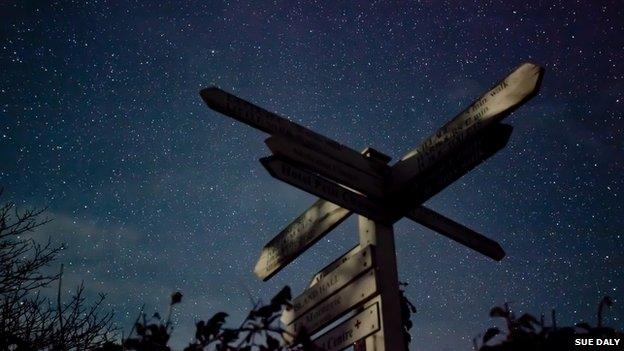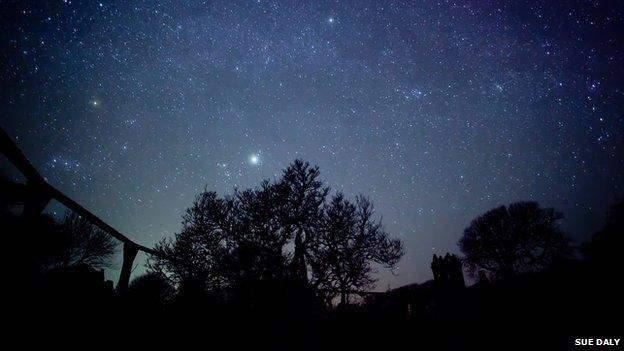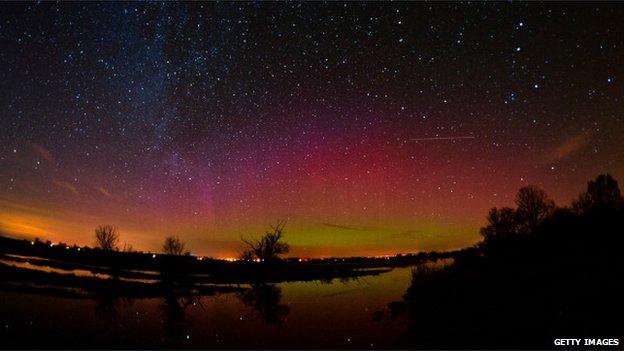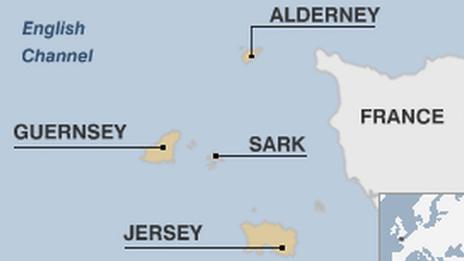The magical mystery of dark Sark
- Published

Sark in the Channel Islands was designated the world's first dark sky island in 2011, by the International Dark-Sky Association. It is now attracting a lot of stargazers.
Annie Dachinger is keen to give me a souvenir of Sark. I've arrived at her home at dusk and as we have a cup of tea, waiting for the night to fall, she hands me a... fridge magnet.
It's a map of Sark, but not as the tourist brochure has it. Looking closely, I see a peninsula tweaked into the pointed hat of a witch.
A broomstick is fashioned from the shape of the far west coast; there's a black cat in the far east.
Dachinger is proud to introduce herself as a white witch. If that surprise didn't leave me coughing on my cuppa, her other title is Star Fleet Commander of the island's astronomy group, SAstroS, external.
Sark's 600-strong population is just as individual as the author Mervyn Peake found it to be in the 1940s.
He was inspired to write a story about a man called Harold Pye, who landed there on a mission to spread love.
With the sky providing one of the best views anywhere of Venus and Mars, there is a clamour among starry-eyed non-islands to choose Sark as an ideal spot for a wedding and a change in the law has made it easier for them to do so. Indeed, there were two weddings on the weekend I visited.
Sark was the first island in the world to achieve dark sky status. The international designation is so coveted, it's the first tourist sign you see coming up the steep way from the harbour, off the boat from neighbouring Guernsey.
Not that I noticed it arriving as I did in driving rain and wind on a tractor-hauled charabanc called "the toast rack". Tractors are the only mechanised vehicles allowed on the island.

Light pollution in urban areas makes stargazing nearly impossible
The lack of cars means there's no dazzling headlights, making it much easier for Sark to be lauded for its perfect darkness.
There are no street lights either and for those enjoying the darkness, the only annoying light source is likely to be a completly natural one - the moon.
Sark's dark sky has been scientifically endorsed. A team of experts made the hour-long boat crossing and carefully inspected the buildings on the island.
They noted all the illuminations, advising on how essential lights could be pointed downwards, and chasing other random glows out of the dark.
SAstroS has a helpful leaflet for incomers: "Here in Sark we note any new lighting. If this is excessive or inappropriate we visit the 'offender' and suggest a better, cheaper and less intrusive way of illuminating their property."

The Sarkees, as they are called, take their dark sky very seriously. Many of the islanders keep binoculars to hand, and if venturing out at night, they'll mask their torches with red cellophane.
Twice a year, Sark's Astronomy Society holds Starfest celebrations, with international guest speakers helping to promote Sark's bid for a proper island observatory.
Just now the Sarkees are gearing up for the Leonids, external, a shooting star display of up to 100 an hour that passes through the constellation of Leo next week.
Annie had just been hosting a meeting of dozens of star spotters, of all levels of knowledge. A telescope was installed in her garden, and around it necks strained back to follow the creamy trail of the Milky Way.
There's plenty of potential for poetry. If the sighting of the aurora borealis in winter is not the shimmering green curtain of the Arctic, Sark's sky-shows still inspire artists and photographers.
In the words of stargazer Penny Prevel, the island's own northern lights shimmer with the "subtle striations of colour in the red spectrum, with duck-egg blue just coming in as though introduced by an eye-dropper".
Walking in such pitch darkness takes some getting used to, and when the moon is but a sliver, imaginations work overtime.
But Prevel says: "Night-time here is far from scary - it is magical."

Guelpe is considered the darkest village in Germany but has not got dark sky status like Sark
Indeed, over tea at Dachinger's, talk turns to island folklore, ancient mysteries, and then darkens to the unexplained.
Outside the curtained windows, the night, just as SAstroS promises, is "very quiet, very dark, and utterly peaceful".
We go outside again. Looking up into a sky lit by a waxing moon, Dachinger produces her "wand", a laser pointer to make it easier to identify the constellations.
Suddenly, a collective gasp.
Just where Dachinger is pointing with a bright green ray, there emerges a massive, blazing, shooting star.
As if by magic, coaxed out of Sark's deep dark sky.
How to listen to From Our Own Correspondent, external:
BBC Radio 4: Saturdays at 11:30
Listen online or download the podcast.
BBC World Service: Short editions Monday-Friday - see World Service programme schedule.
- Published31 January 2011
- Published16 January 2014
